Throughout history, the East and the West have been worlds apart, divided by natural barriers, oceans, mountains and deserts. The result has been different histories of separate worlds despite their common belief in the same God, the same prophets, and similar religious values.
In the Middle Ages, when the West sank into the Dark Ages, the Muslims reached the height of their enlightenment as their scientists, doctors, engineers, philosophers and universities led the world. Western scholars came east to learn from the Arabs, with Latin providing a bridge for the transmission of ideas.
However, these two worlds first clashed when the Christian crusaders converged on Jerusalem. They were defeated by the great Salahuddin Ayubi, following which they withdrew and went back home.
The West seemed to offer no challenge to the Ottomans, the Safavids, or the Moghuls. The three Muslim gunpowder empires grew in strength as they developed professional armies and dominated the world. All three were land empires. The great Moghuls had never seen the ocean and the Safavids maintained no navy. Even the Ottomans, who were a Mediterranean power, were put on the defensive by the battleships of Venice and Spain until Suleiman the Magnificent had the brilliant idea of appointing the pirate Barbarossa to head his navy. Whereas Timur, the greatest Muslim conqueror fought on land, the western heroes such as Columbus and Vasco de Gama were sailors.
Blocked from expanding across Europe and Asia, Columbus and the others who followed his example, braved the Atlantic Ocean to search for the New World. They found not just a new world, but also gold in vast quantities. In the twentieth century, the oil-rich Arabs flew west with their petrodollars to buy whatever was on offer; in the sixteenth century, the gold-rich Europeans sailed east with their treasure chests laden with good coins to buy superior quality goods. They also refined their production of armaments and their armies; finally, their superior military skills were hired by the rulers of the East. This was the beginning of the lucrative arms industry that has grown to monstrous proportions over the centuries.
While the West advanced, the East degenerated. The great Ottoman Empire, once famous for its efficiency, fell into bureaucratic decay and corruption. All access to state machinery was controlled by courtiers and bureaucrats, who used their power to delay and deny access unless they were compensated with bribes. The Ottoman Empire became a paperwork nightmare. To negotiate one’s way through it, a person needed to bribe people who knew people who could provide access to the corridors of power. The great Muslim empires were rendered rotten to the core by a corrupt bureaucracy. Education in the West improved and overtook the superiority of the Muslims in knowledge, science and technology. In the new West, knowledge was king; in the East, religion dominated and dogma replaced reason.
By 1643, Moghul India was the richest country in the world, with a GDP that was more than 10 times that of Great Britain. However, by 1673, the Moghuls were surpassed by the Great Qing of China, and furthermore were themselves taken over and replaced by the British East India Company, whose Gross Domestic Product (GDP) was six times that of Great Britain, and more than the combined GDP of France, Russia, Great Britain, and Italy. The wealth of The East India Company could be compared with continents; national economies were too small by comparison. After the Great Mutiny of 1857, the East India Company fell under the control of the British Raj. The Raj together with Great Britain, now emerged as the largest economy in the world. The US ranked third. By the beginning of the 20th century, the US was the single largest national economy in the world, though still smaller than the UK and the British Raj combined. By 1960, the combined economies of China and India were smaller than the USSR and one-sixth that of the US.
In Afghanistan, the British suffered defeat in two wars, the First and Second Anglo-Afghan Wars. Why the British went to war twice in Afghanistan is not clear; there was nothing there to take, but British strategists claimed that war was necessary because of The Great Game in which they matched off against Russia. Britain wanted security for the great empire they had built in India, and Afghanistan could be a no-man’s land between the Raj and Russia.
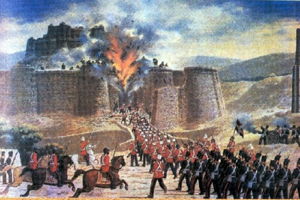
After the two Great World Wars in the early twentieth century, it looked like an opening had been created for the new Muslim nations – Pakistan, Indonesia, Iraq, Malaysia and the others – to emerge, as Britain, exhausted by war withdrew from the empire. The country of Turkey was born after the First War when Ataturk gave up the Ottoman Empire to create a nation-state. The First Lord of the Admiralty, Winston Churchill, gambled his career on an attack at Gallipoli, but when defeated by the brilliant tactics of Ataturk, he was forced to resign his office and the Asquith government fell. In Egypt, Nasser nationalised the Suez Canal Company, survived the joint attack of Britain, France, and Israel in the Suez war, which forced the British PM Atlee to resign. In Iran, Mossadeq nationalised the Anglo-Iranian oil company, Britain’s greatest corporate asset. He was removed in a counter-coup initiated by the CIA and the Shah was brought back from his temporary exile in Rome, only to be removed a few decades later by Ayatollah Khomeini.
As the British withdrew from the greatest empire the world had ever seen, they were replaced by America, which had three main interests. Firstly, to contain the USSR, secondly to control oil in the Middle East, and thirdly, to promote Israel, to secure their armaments’ sales to the region. In the 1950s and 1960s, America dominated the world; our streets were filled with American cars, our homes with American goods; our militaries became US-dependent for their equipment, and American culture, movies, music and language infiltrated our thinking. But imperial America grew fat, arrogant, and lazy, always looking to take more than they would give in their interaction with the world. However, as the productivity of the world grew, the competitiveness of the US lost its edge and their exports could no longer compete in quality or price. More and more, the US relied on just two tools to dominate the world: their military and the dollar.
After Nixon took the dollar off the gold standard, the dollar had no intrinsic worth. As US imports exceeded their exports, the dollar was threatened by devaluation. The US countered by persuading Saudi Arabia, the world’s dominant oil exporter at the time, to accept only dollars in exchange for their oil. The other oil-producing nations followed suit. While the world produced goods for the US to buy, the US produced dollars to buy these goods. When Gaddafi, Saddam, and Chavez threatened to take their oil sales off the dollar, they were forcibly removed. The US military, with a budget greater than the next 10 largest militaries of the world combined, and the example they had made of leaders that stepped out of line, ensured compliance.
The US wanted total control of the oil in the Middle East, which was the pillar supporting the American way of life. The militant Islamist response against the American intruders resulted in the War on Terror, replacing the Cold War against the USSR, which ended in the break-up of the USSR following their Afghan War. After the dramatic events of 9/11, this degenerated into total war as the US set about destroying Iraq and Afghanistan. The Iraq war gave America control of Iraqi oil, and the strange US governance in which cash payments without accountability and contracts without tenders became the norm, created criminal fortunes. The US flew in monthly ‘cash packs’ and then trucked the cash packs to their required destinations in Iraq. In one notorious case, a billion dollars in cash disappeared along with the truck and the truck-drivers.
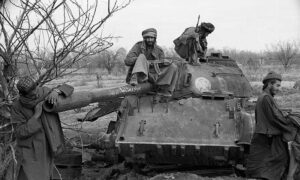
Unlike Iraq with its oil for plunder, Afghanistan offered nothing other than political satisfaction to America and revenge for 9/11. If they sought plunder, they had to plunder their own money; so America sanctioned more and more US funding, which was siphoned off into the coffers of their own companies or which enriched their collaborators. The long lasting war in Afghanistan served no purpose other than help the select get rich quick. Finally, tired of this no-win scenario in Afghanistan which served no purpose whatsoever, the Americans closed shop and went home. The Brown University project, ‘The Cost of War,’ stated that over 929,000 people were killed in the violence of the post 9/11 wars, in Afghanistan, Pakistan, Iraq, Syria, Yemen, and elsewhere; 38 million people were displaced in the last two decades in these wars.
The US historian Paul Atwood says, “War is the American way of life. Since its Independence on July 4th 1776, in more than 240 years, the US was not at war for merely 16 years. Its path towards global dominance was built on war, slavery, and slaughter.”
The US withdrawal from Afghanistan is the end of an era. The US dependence on Middle East oil determined their foreign policy for half a century. Now with US domestic shale oil production supplying 10 million barrels a day, they no longer need to import oil from the Middle East. They have been replaced by China that now buys 10 million barrels a day. It is inevitable that China will become more important than the US to the oil-producing countries of the Middle East. Already Iran and Central Asia have linked their economies to China. The Kingdom of Saudi Arabia and the UAE are still looking to the US for protection and have even opened their doors to Israel, but for how long can they resist the tide of history?
The US withdrawal from Afghanistan opens up vast opportunities for China, which will become the principal investor in mining and infrastructure. Turkey and Iran will also enter the smaller projects and may move fast to buy the military hardware left behind by the US, as happened after the fall of the USSR. New arms-dealers, new lords of war will emerge.
Pakistan will be the most affected by the change in Afghanistan. The first impact on Pakistan — and it is already happening — is a deterioration in the rupee/dollar rate. The US was shipping dollars to Afghanistan; the oversupply resulted in a lower dollar rate and dollars were exported to Pakistan. Now with the curtailed dollar supply in Afghanistan, dollars are being purchased by the Afghan traders in Pakistan in large quantities, which some claim amount to 20 percent of the dollars purchased by the Pakistani market. The export of dollars, when added to the rising current account deficit, has lowered the rupee rate drastically since the Americans left.
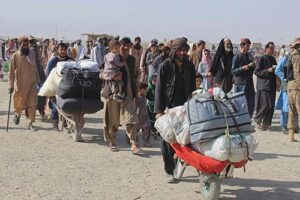
in Chaman, Pakistan.
The exodus of Afghan refugees to Pakistan will increase, creating a further burden on Pakistan’s ailing economy. The TTP (Tehreek-e-Taliban Pakistan) will make further inroads into Pakistan; already battles are being fought in Waziristan and Balochistan. This is likely to escalate. The trade in heroin will grow, and the main route for export will be through Pakistan. This will make some rich, but will result in the growth of addiction. The escalating drug money will raise the price of property in Pakistan. Islamabad will be a prime property market for the new drug lords. Law and order will deteriorate.
Pakistan has contributed to the Taliban victory, and will expect payback. The health and education sectors in Pakistan feel that they can sell their services to Afghanistan. Industrialists are looking for opportunities such as in textiles. Pakistan may also be able to offer military services to the new Afghan army.
Change creates opportunity, but it also creates new dangers. The Taliban are proud of their victory. The myth grows that Afghanistan is the graveyard of empires: the British were defeated in the two Afghan Wars; the USSR was destroyed by their Afghan War; the Americans have gone home with their tail between their legs. The Taliban can easily grow arrogant, overestimate their strength and make costly mistakes that could take them down instead of up. It is said that pride comes before a fall.
With the withdrawal of the West has come the advance of China. Malaysia and Indonesia, two important Muslim states in the East, have large and powerful Chinese populations that dominate business. They have thrown in their lot with China, and have become less involved with the Muslims of South Asia, and the Middle East; meanwhile, Iran, Pakistan and Africa are growing more dependent on China. Some states will prosper in their new relationship with China, some will mismanage the opportunity. In Pakistan, the CPEC has slowed down due to Pakistan failing to honour their contracts with Chinese companies.
It would be a mistake to imagine that the Americans would just go home and play no part in the future of Asia and Africa. Through their military-industrial complex, they have an economy linked to war. They still control the dollar, the IMF/World Bank financial systems, enjoy a technological lead over the world and, by far, have the world’s strongest military. They can attack without putting boots on the ground, and they can cripple economies by holding back IMF support. They can open or raise tariff barriers, which can make or break industries and exports. Countries that fail to kowtow to America, their interests will suffer. In Asia, US support to India will strengthen and raise the country’s importance in the region. India, with its massive trade with China, will try to arrive at a working relationship in which economic interaction overrides strategic hostilities.
The rivalry of superpowers has been studied by the American scholar, Graham Allison who, in his book, Destined for War, writes that when a rising power threatens to displace a ruling one, the most likely outcome is war. War in the 21st century is very different from the twentieth century war that killed the enemy, destroyed their property, and seized their land to eliminate the threat. 21st century war will involve trade wars, tech wars, cyber wars, and economic sanctions to weaken perceived enemies, so that they are unable to function and their stability and security are destroyed. The US left Libya, Iraq, Iran, Syria, Vietnam and Venezuela in a shambles. So far, the Americans have only seized Afghan dollar reserves. Will that be enough to satisfy their urge for revenge? The last challenge to US supremacy was from the USSR. This resulted in the Cold War in which the US and the USSR did not use bombs or bullets against each other, but did conduct proxy wars in Korea, Vietnam, Afghanistan, and elsewhere.
Three questions need to be answered. First, will Taliban rule stabilise Afghanistan? Second, will the changes in Afghanistan stabilise or destabilise Pakistan? Third, what direction will the US-Pakistan relationship take?
The general opinion is that Afghanistan will see instability over the next few years. In Pakistan, the TTP is already fomenting trouble in Waziristan and Northern Balochistan, and the Jamia Hafsa, the seminary attached to the Lal Masjid in Islamabad, has again started to confront the government. Imran Khan offered amnesty to the TTP, but they have refused to accept it. The law and order situation in Pakistan is likely to deteriorate. A nation can be protected by education, but the future of education in Pakistan is at risk as the PTI government ‘seeks to clump the islands of private excellence with the marshes of public dysfunction and drown both with the deadweight of a clumsy incomplete curriculum.’
Hamid Gul, the former DG ISI, observed that when history is written it will be stated that the ISI defeated the Soviet Union in Afghanistan with the help of America. Another sentence will be added to it now: the ISI defeated America with the help of America. Husain Haqqani, a former ambassador to the US writes, “the US is unlikely to soon forgive Pakistan for its decade-long enabling of the Taliban. Pakistan got what it wished for but will come to regret it. The Taliban takeover will leave Pakistan more vulnerable to extremism back home and isolation in the world.”
Trump said, “Pakistan has given us nothing but lies and deceit.” Antony Blinken, the US Secretary of State, commented, “Pakistan has a multiplicity of interests, some that are in conflict with the US.” Biden’s reluctance to talk to PM Imran Khan is very significant, while Imran Khan may have further infuriated the US by declaring that Afghanistan has “broken the shackles of slavery.” There is apprehension of US sanctions being imposed at a time when Pakistan is trying to restore the IMF programme.
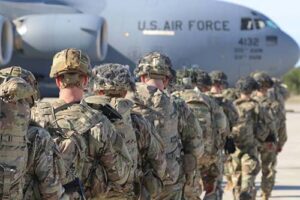
America has received a setback and an embarrassing loss of face, but still remains the most powerful country with the strongest military, the largest market, and a huge economy supported by the US dollar, the world’s reserve currency. For them, the game is by no means over. The mounting challenge to America by China, leaves an uncertain future for Pakistan and the Middle East. Pakistan is totally dependent on China, but sits between the Islamic fundamentalist governments of Iran and Afghanistan on its west and Modi’s Hindu fundamentalist government on the east. It appears to be simply a matter of time before Pakistan joins the fundamentalist trend in the region, while the populist Imran Khan keeps himself busy with vilifying the rich to earn points with the poor, as he doles out money to the underprivileged rather than use it to pay the country’s mounting liabilities.
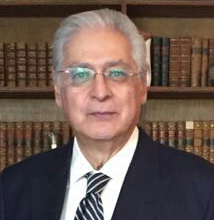
The writer is a businessman and the author of three books including Muslims: The Real History.



